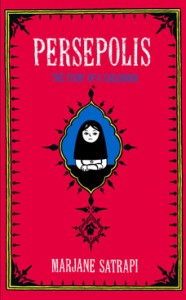 The attempt to ban Marjane Satrapi’s Persepolis from Chicago schools awoke immediate protest among students, teachers, parents, and free speech advocates such as CBLDF. The circumstances behind the ban are still unclear, but a recent opinion article in The Atlantic gives a teacher’s perspective to the situation and takes Chicago Public Schools to task for a bureaucracy that interferes with learning.
The attempt to ban Marjane Satrapi’s Persepolis from Chicago schools awoke immediate protest among students, teachers, parents, and free speech advocates such as CBLDF. The circumstances behind the ban are still unclear, but a recent opinion article in The Atlantic gives a teacher’s perspective to the situation and takes Chicago Public Schools to task for a bureaucracy that interferes with learning.
In his article for The Atlantic, Noah Berlatsky — an educational writer and curriculum developer who has more than 20 years of experience — discusses the various times that his own work has been proscribed by school administrations:
On one project, a colleague of mine working on a world history course was told not to include the fact that gay people were targeted during the Holocaust. In another instance, I was told that I could not, for sensitivity reasons, include a test passage about storms at sea. Passages about rats, or alcohol, or love, or death were similarly proscribed. So were passages that depicted, or even mentioned, slavery — and this was for an American history exam. Again, there were sensitivity concerns, though whether we were worried about offending black people or white people, I don’t know. Probably both.
CPS CEO Barbara Byrd-Bennett has claimed that Persepolis was not banned outright, but that it has been deemed inappropriate for 7th grade students and is currently under review for use in grades 8-10. It has been approved for use by 11th and 12th grade students, but CPS has now mandated special training for the teachers using the book in class. Throughout the muddled message that CPS has delivered in response to the protest over the removal is the contention that violent imagery and graphic language in the book are inappropriate for 7th grade students. Berlatsky expresses no surprise that an attempt was made to ban Persepolis, and he eviscerates the justification for the removal and how keeping children safe from “dangerous” knowledge has an adverse effect on education:
The truth is, outside of arithmetic, it’s hard to teach anything worth learning that someone won’t find offensive or upsetting or frightening or off-putting. If it’s interesting, if it’s something people care about, then people are going to have opinions about it. That means somebody, somewhere, isn’t going to like it. The drive to keep our children perfectly safe from dangerous knowledge just ends up reducing their education to a bland, boring, irrelevant slog.
Berlatsky then addresses the decision we must ultimately make to balance the desire to protect children with the need to let them learn:
So we’re faced with a choice. Do we want to micromanage our schools for ideological purity? Or do we want kids to learn something — even, sometimes, something with which we might disagree? If we want the first, we should keep on as we’re keeping on. If we want the second, we need to stop being so worried that teachers might teach the wrong thing that we don’t let them teach anything at all.
Chicago is a city that has been marked by violence recently, garnering the attention of national and international media outlets. In such an atmosphere, the argument that the content of Persepolis is too violent and too profane for 13-year-olds (and possibly for 14- to 16-year-olds) carries little weight. These students have experienced violence and profanity in the real world, and many of them have been primary witnesses to violence. Berlatsky closes his essay by pointing out that the fear of Persepolis may not actually be about the content but that students may relate too closely to the author’s experiences:
The worry, then, seems to be not so much that the material will be too much for them (like horror films in first grade), but that it might fit too well — that the students might feel like the story has something to do with their lives. Perhaps they might even see, in the senseless, narrow-minded institutions of Iran, an analogy to narrow-minded institutions closer to home.
You can read the entirety of Berlatsky’s essay here.
Previous CBLDF coverage of the Persepolis ban:
WTTW’s Chicago Tonight on PERSEPOLIS Ban
Furor Continues Over PERSEPOLIS Removal
CBLDF Rises To Defense of Persepolis
UPDATED: Persepolis Reportedly Banned In Chicago School
Please help support CBLDF’s important First Amendment work and reporting on issues such as this by making a donation or becoming a member of the CBLDF!